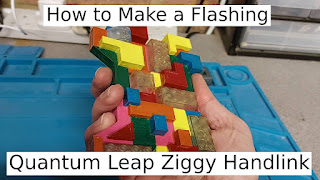Amateur Radio Foundation Licence
Radio has always been an interest of mine from a young age and it's probably the main reason why so many radio related projects feature on this blog. As we all have time on our hands at the moment, I decided to put the time to good use and study for my amateur radio Foundation licence.
Not knowing where to start, I turned to Google and quickly found the Essex Ham group who offer a free training course. I signed up with them and even joined them on a couple of their live Q&A sessions. Now Essex Ham are a really interesting group, have you ever met someone who is just genuinely so nice and helpful? Well, that describes this group, they are simply marvellous and give up their free time to help promote the hobby and tutor people who want to learn.
Due to the pandemic, the Foundation exam consists of only the theory exam as the practical element (that would normally take place at a group club meeting) can't be carried out but I still found that studying for the theory alone was difficult. I think my brain isn't used to learning like it used to. I booked my exam to help keep me focused, took it and got the result instantly. I passed, having achieved a score of 23/26 but you are allowed to get 7 wrong and still achieve a pass.
If you are looking to take up the hobby, do it whilst we have all this time on our hands. I've tried to put together a few points to help other out:
- Take the time to listen. Even if you don't own any equipment yet, you can still take advantage of WebSDR to listen in. My favourite is Hackgreen and through listening to how people conduct themselves, it will give you a good idea of what to expect.
- Sign up to the free Essex Ham Foundation course. These guys have been great, I couldn't have done it without them.
- Book your exam with the RSGB and book it early. Having a deadline to work towards will keep you focused. There is a cost involved, £27 but in the grand scheme of things, it's not that bad.
- Buy a book to help with your studies. I bought Foundation Radio: Revision Questions off Amazon and I found it helped a great deal.
So what happen next?
Within the space of a week I received my certificate from the Radio Society and from here I was able to log onto the Ofcom website and register my call sign. Having studied for the exam, it turned out that this was the hardest part of the whole process - choosing a suitable call sign. I could let Ofcom allocate me the next available call sign but you also have the opportunity to choose your own (if it's available). Foundation licence call signs currently start with M7 followed by three letters and it's these three letters that I could pick. I went through the usual ones that sprang to mind : TEA, JEZ, etc but they were all taken. In the end I went with the Marvel Cinematic Universe MCU and so M7MCU became the latest call sign to be registered.
There was something that I didn't bank on and that was mic shyness. I understand that this is a common problem with people who have passed their exam. I thought the only way to overcome it was to listen some more to be sure of the correct way of doing things before taking that first step. I guess this is the issue with a lack of practical sessions but I made my first contact and it is so exciting.
In this short space of time, I'm beginning to only realise the different avenues the hobby can lead me down, it's incredibly really. I'm now trying to learn Morse code, use the local repeaters and thinking about antenna construction.




Comments
Post a Comment